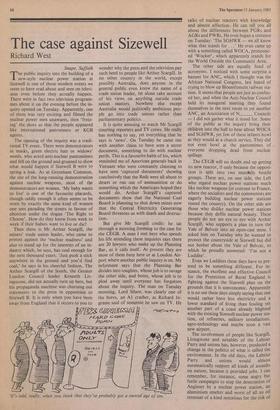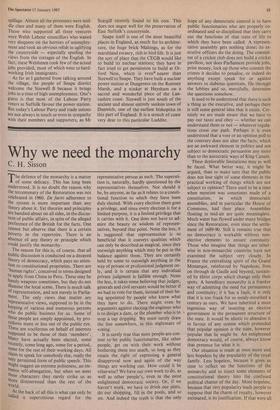The case against Sizewell
Richard West
Snape, Suffolk The public inquiry into the building of a I new-style nuclear power station at Sizewell is one of those modern events we seem to have read about and seen on televi- sion even before they actually happen. There were in fact two television program- mes about it on the evening before the in- quiry opened on Tuesday. Apparently, one of them was very exciting and filmed the nuclear power men unawares, then 'freez- ing' the shots so that the people appeared like international gunrunners or KGB agents.
The opening of the inquiry was a tradi- tional TV event. There were demonstrators in masks, green electric hair or widows' weeds, who acted anti-nuclear pantomimes and fell on the ground and groaned to show what would happen if Sizewell B were to spring a leak. As at Greenham Common, the site of the long-running demonstration against nuclear weapons, most of the demonstrators are women. 'My baby wants to live' is one of the favourite placards, though oddly enough it often seems to be worn by exactly the same kind of women one sees parading the streets in favour of abortion under the slogan 'The Right to Choose'. How do they know from week to week if their babies want to live or die?
Then there is Mr Arthur Scargill, the miners' trade union leader, who came to protest against the 'nuclear madness' and also to stand up for the interests of an in- dustry which, he says, has coal enough for the next thousand years. 'Just push a stick anywhere in the ground and you'd find coal,' he says in his cheerful fashion. The Arthur Scargill of the South, the Greater London Council leader Kenneth Liv- ingstone, did not actually turn up here, but his propaganda machine was churning out statements to the press in opposition to Sizewell B. It is only when you have been away from England that it occurs to you to wonder why the press and the television pay such heed to people like Arthur Scargill. In no other country in the world, except possibly Australia, does anyone in the general public even know the name of a trade union leader, let alone take account of his views on anything outside trade union matters. Nowhere else except Australia would politically ambitious peo- ple go into trade unions rather than parliamentary politics.
It is quite amusing to watch Mr Scargill courting reporters and TV crews. He really has nothing to say, yet everything that he says is 'news'. On Tuesday he came out with another claim to have seen a secret document, something to do with nuclear perils. This is a favourite habit of his, which reminded me of American generals back in Vietnam who were constantly claiming to have seen 'captured documents' showing conclusively that the Reds were all about to desert or run out of ammunition or do something which the Americans hoped they would do. Arthur Scargill's captured documents show that the National Coal Board is planning to shut down mines now that the Central Electricity Generating Board threatens us with death and destruc- tion.
But give Mr Scargill credit: he sat through a morning listening to the case for the CEGB. A man I met here who spends his life attending these inquiries says there are 20 lawyers who make up the Planning Bar, as it calls itself. At present they are most of them busy here or at London Air- port where another public inquiry is on. My informant says that the Planning Bar divides into toughies, whose job is to savage the other side, and bores, whose job is to plod away until everyone has forgotten about the inquiry. The man on Tuesday morning, Lord Silsoe, was clearly one of the bores, an Al crasher, as Richard In- grams said of someone he saw on TV. He
'It's odd, really, when you think that they've probably got a mental age of ten.'
talks of nuclear reactors with knowledge and almost affection. He can tell you all about the differences between PGRs and AGR5 and PW Rs. He even began a sentence on Tuesday: 'The SGHWR — we all know what that stands for ... ' He even came up with a something called WOCA, pronounc- ed 'Wocker', which apparently stands for the World Outside the Communist Area.
The other side are equally fond of acronyms. I noticed with some surprise a banner for ANC, which I thought was the African National Congress, last heard of trying to blow up Bloemfontein railway sta- tion. It seems that people are just as confus- ed her, and when the Anti-Nuclear Council held its inaugural meeting they found themselves in the next room to yet another
ANC, an Association of N Councils — I did not gather what it stood for. Some of the public at the inquiry bring their children into the hall to hear about WOCA and SGHWR, yet few of these infants howl as they would at a church service. They did not even howl at the pantomimes of everyone dropping dead from nuclear spillage.
The CEGB will no doubt end up getting its new reactor, if only because the opposi- tion is split into two muttlally hostile groups. These are, on one side, the Left who regard nuclear power stations much like nuclear weapons (in contrast to France, where the socialists and the communists are eagerly building nuclear power stations round the country). On the other side are those who dislike nuclear power stations because they defile natural beauty. These people do not see eye to eye with Arthur Scargill, who supports a plan to turn the Vale of Belvoir into an open-cast mine. I asked him on Tuesday why he wanted to protect the countryside at Sizewell but did not bother about the Vale of Belvoir, to which he proudly answered: 'I'm not a Luddite'.
Even we Luddites these days have to pre- tend to be something different. For in- stance, the excellent and effective Council for the Protection of Rural England is fighting against the Sizewell plan on the grounds that it is uneconomic. Apparently it is no use these days simply saying that one would rather have less electricity and a lower standard of living than fouling yet another part of a coast already blighted with the existing Sizewell nuclear power sta- tion, oil refineries, military installations, agro-technology and maybe soon a vast new airport.
The involvement of people like Scargill, Livingstone and notables of the Labour Party and unions has, however, produced a change in the politics of what is called the environment. In the old days, the Labour Party and unions would almost automatically support all kinds of assaults on nature, because it provided jobs. I can remember, for instance, some angry but futile campaigns to stop the desecration of Anglesey by a nuclear power station, an aluminium smelter and worst of all an oil terminal of a kind notorious for the risk of spillage. Almost all the protesters were mid- dle class and many of them were English. Those who supported all three ventures were Welsh Labour councillors who waxed very eloquent on the horrors of unemploy- ment and took an obvious relish in uglifying the countryside — especially spoiling the views from the cottages of the English. In fact, these Welshmen took few of the actual jobs provided, most of which went to hard- working Irish immigrants.
As far as I gathered from talking around the village, the people of Snape district welcome the Sizewell B because it brings jobs in a time of high unemployment. One's guess is that most of the Labour Party voters in Suffolk favour the power station. But today's Labour Party and trade unions are not always in touch or even in sympathy with their members and supporters, as Mr Scargill recently found to his cost. This does not augur well for the preservation of East Suffolk's countryside.
Snape itself is one of the most beautiful places in England, as much for its architec- ture, the huge brick Makings, as for the marshland estuary, rich in bird life. It is just the sort of place that the CEGB would like to build its nuclear stations; they have in fact tried to get permission to build at Or- ford Ness, which is even* nearer than Sizewell to Snape. They have built a nuclear power station at Dungeness on the Romney Marsh, and a stinker at Heysham on a sacred and wonderful piece of the Lan- cashire coast. Sizewell is just south of the ancient and almost entirely sunken town of Dunwich, one of the earliest bishoprics in this part of England. It is a stretch of coast very dear to this particular Luddite.







































 Previous page
Previous page